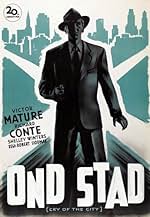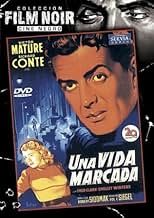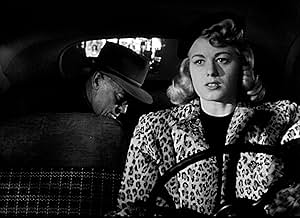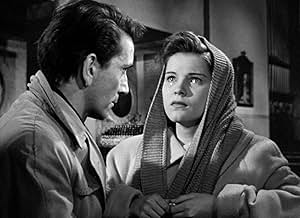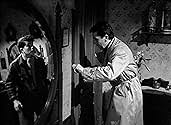Il tenente di polizia Candella, amico da lunga data della famiglia Rome, cammina sul filo del rasoio nel caso dell'assassino di poliziotti Martin Rome.Il tenente di polizia Candella, amico da lunga data della famiglia Rome, cammina sul filo del rasoio nel caso dell'assassino di poliziotti Martin Rome.Il tenente di polizia Candella, amico da lunga data della famiglia Rome, cammina sul filo del rasoio nel caso dell'assassino di poliziotti Martin Rome.
- Regia
- Sceneggiatura
- Star
- Premi
- 1 candidatura in totale
- Man
- (non citato nei titoli originali)
- Mama Roma
- (non citato nei titoli originali)
- Barber
- (non citato nei titoli originali)
- Mr. Masselli
- (non citato nei titoli originali)
- Elevator Operator
- (non citato nei titoli originali)
- Rosa
- (non citato nei titoli originali)
- Detective Loomis
- (non citato nei titoli originali)
Recensioni in evidenza
"Cry of the City" is a moralist police story, with the fight between good, represented by Lt. Candella, and evil, represented by Martin Rome. Both characters have the same origins in the lower class neighborhood, but follow different paths of law: while Candella accepts to earn a low salary and "sleep well at night", the manipulative Martin uses people and prefers to taste the pleasures of life whatever the final price is. Their duel has a predictable and corny conclusion, but the story is engaging and supported by a beautiful black and white cinematography and good acting. My vote is seven.
Title (Brazil): "Uma Vida Marcada' ("A Marked Life")
Note: On 20 Dec 2018, I saw this film again. Now my vote is eight.
Plot-wise, CRY OF THE CITY is that old chestnut about two boys from the same neighborhood (New York's Little Italy, presented with far more nuance and authenticity than Hollywood's usual spaghetti-with-meatballs style) who grow up on opposite sides of the law. Lieutenant Candella (Victor Mature) pursues Martin Rome (Conte) relentlessly after he escapes from a prison hospital; Rome is determined to clear his girlfriend of suspicion in a jewel theft by finding the real culprits. The plot is just a scaffolding to support a series of scenes in which Rome and Candella alternately vie for leverage and influence over an eclectic parade of supporting characters, all of whom seem driven by fear or greed. Desperation inhabits the city like weather. Director Siodmak, one of the masters of film noir, suffuses the film with a dark mood, atmospheric locations, and those corrupted personal transactions that define the genre.
In a hospital in the middle of the night a priest murmurs and family-members weep quietly over a dying man who is chained to his bedMartin Rome has just killed a cop in a shoot-out. Later, after he has escaped and collapsed again, his girl (Shelley Winters in a leopard-print coat) enlists an unlicensed foreign doctor to treat him in the back seat while they drive around damp city streets, using neon signs for light. Stolen jewels get stashed in a locker in a subway station. Marty almost meets his match in a massive, burly masseuse (Hope Emerson), who looms over him as he works his bright-eyed, caressing charm. Their scene together is funny, scary and perversely titillating all at once, as the mountainous woman starts to massage his back and then gets her hands around his throat. Sadder is Marty's seduction of a plain, middle-aged hospital nurse who is burdened, we later find out, with a nasty, selfish, annoying old mother. At one point Candella reads off to Marty a list of all the former girlfriends the cop has had to look up, and Marty amusingly reacts to each name with regret, embarrassment or fondness. For this tough guy, sex appeal is as powerful a weapon as a gun or a knifesometimes it's the only one he has.
All the time we're rooting for Martyat least I was. CRY OF THE CITY perfectly demonstrates how easily movies can mess with one's moral compass. Marty is a killer and a selfish, remorseless crook, but his élan and vulnerability make him an irresistible underdog. His adversary, Candella, is a self-righteous moralizer, a monomaniacal Javert whose hatred seems inspired more by his enemy's charisma than by his crimes. Victor Mature's heavy, stolid presence sharply contrasts with Conte's proud, dazzling quickness. Someone once described Mature as an intelligent actor cursed with the face and physique of a dissipated life guard; I forget who wrote that, but it hits the nail on the head. The poor guy *looked* like a bad actorall beef and no brainseven though he wasn't. Here his scenes with the Rome family are intended to soften his character, and he does have likable moments, but the way he turns them allfinally even the kid brotheragainst Marty only increased my sympathy for the endangered outcast. His accusation that Marty uses people is fair enough, but he lays it on too thick; it wasn't Marty's idea to enlist the illegal doctor or the "trusty" who helps him break out of jail. Booming, "Stop in the name of the law!" Candella embodies implacable authority, and who could root for that?
I like to think that in real life superficial concerns like these wouldn't get in the way of my knowing right from wrong, but this is a movie; style is bound to trump substance. Are films like this onemade under the Hays Code, when movies were not allowed to openly glorify criminalsdeliberately subversive? The script says one thing, but the casting says another. In a way, that hypocrisy is essential to noir, an under-the-radar phenomenon that made caustic comments about human nature while ostensibly endorsing the Ten Commandments. For Martin Rome, a premature death isn't too high a price to pay for all the fun he had breaking the rules. And a clichéd ending is not too high a price for the pleasure of this movie.
In fact, the film features a number of unusual and unheralded players that spice up the proceedings—Walter Baldwin as the trustee Orvy, crooked teeth and all; Betty Garde as plain- looking nurse Pruett, who takes no guff from anybody including cops; and Barry Kroeger as puffy-face lawyer Niles, an insult to his profession. These are not pretty people in the usual Hollywood sense, and I think one of the fascinations of noir is to feature such types at a time when movies prized good-looking people above all. Here, along with the shambling Emerson, they leave us with an impression of real city streets instead of a casting call along Hollywood and Vine.
Among the more conventional, it's fun to see a still slender Shelley Winters (Brenda) doing her cheap blonde bit as she fends off a tipsy masher in a bar. Her character sort of drops into the narrative out of nowhere, making me wonder whether something connective got edited out. Frankly, headliner Victor Mature (Candella) hasn't much to do except stand around and look handsomely imposing. Instead, co-star Conte gets all the best scenes, good lines, and audience interest. At the same time, something should be said for young Tommy Cook who makes a good gritty impact as Conte's younger brother.
Then too, check out director Siodmak's visual approach to the filming. Usually the light and shadow of expressionist noir takes place on a sound stage where control is absolute. But here, the imaginative Siodmak mixes expressionist light and shadow with location shooting to create an unusual overall effect. Note the number of location shots without the natural lighting that ordinarily would create a more documentary feel. It's a curious but effective blend. In passing—note too Siodmak's beautifully paced direction of the jailbreak sequence, a really suspenseful look at bureaucratic paper-shuffling, in this case, a police department.
The story itself is pretty shopworn—two friends growing up together in the ghetto, where one ends up becoming a cop, while the other turns to crime. In short, the sort of thing Cagney and O'Brien did in the 30's. Nonetheless, Siodmak's imaginative approach, plus the many interesting characters and entertaining vignettes make this version a noir worth catching up with.
What Ford was to the western, Hitchcock to suspense, Sirk to melodrama, so was Robert Siodmak to the noir. While "Cry of the City" is often left out of discussions of the genre, it is, in many ways a near perfect example of the genre.
By 1948 the noir was beginning to hit its stride. Siodmak came to this project with much valuable experience. His execution of this not especially remarkable story has a fluidity and assurance of style that one can only marvel at.
Despite the well worn cop vs. gangster tale, there is a potent psychological complexity at the core of "Cry of the City". Richard Conte's Martin Rome, is charismatic and charming. Not only does he work his magic on unsuspecting females, we the audience are firmly on his side at the start of the movie. As the plot unfolds his ruthless, selfish and manipulative motives become apparent. Yet it will take some time before we are completely convinced. It's a masterly stroke of screen writing. It will take Victor Mature's impassioned indictment to completely convince us.
Victor Mature is surprisingly competent in the lead in what must be surely one of his best roles. Richard Conte is simply superb in a complex and tricky role. His method is one of economy and subtlety and a lesson to screen actors. Despite a host of fine performances, Conte seems to not have garnered the respect he deserved.
A classic of its kind.
And the leads are Victor Mature and Richard Conte. Mature is good as the upright cop who makes it personal to go after Richard Conte who has now committed the ultimate sin, he's killed a cop. But like a film a year earlier for Mature, Kiss Of Death, the film is dominated by Richard Conte who plays a charismatic and fascinating villain just as Richard Widmark did in Kiss Of Death.
Unlike Widmark who is a loner, Conte is charming and is ruthless in his use of that charm. The film opens with him seriously wounded after shooting a police officer. But he recovers and is in a prison hospital awaiting trial. It's the death penalty for sure, but Conte does in fact charm his way into an escape (I won't say how) and from then on because of his wound has to rely on a lot of help including his own family.
Some other standout performances including an old girl friend, Shelley Winters whom he has obtain an unlicensed physician to tend him. Hope Emerson who is as evil as she was as the prison matron in Caged, plays a masseuse who Conte uses to obtain traveling money as the woman is quite mobbed up. Tommy Cook plays Conte's hero worshiping younger brother who realizes just how much he and the family were being used in the climax.
Most of all there's Berry Kroeger who plays one of his usual slime ball characters as a criminal attorney who indulges in a bit of criminality himself most discreetly behind the scenes. Kroeger split parts like that with George MacReady back in the day and is always fascinating to watch.
Most of all there is Richard Conte who should have merited Oscar consideration in one of his best screen performances.
Lo sapevi?
- QuizThe film was set to be released under the title of "The Law and Martin Rome", when a lawyer from Baltimore, Maryland named Morton E. Rome contacted the studio threatening to sue, saying the film would damage his career and expose him to ridicule. Exhibitors were also objecting to the title, so to please them and avoid the suit the title was changed just before the film's release.
- BlooperPhantom Bullet: During the struggle in his office, Niles fires his gun, missing Marty but killing the woman eavesdropping outside the frosted glass door. Yet the glass does not shatter, nor is there a hole in the surrounding woodwork or plaster...as if the sound alone killed her.
- Citazioni
Martin Rome: I had enough of that when I'm a kid. Crummy tenements, no food, no clothes.
Lt. Vittorio Candella: Oh, save it for the jury, Marty. Who do you think you're kidding? l was brought up in the district too. I've heard that dialogue from you poolroom hotshots ever since l was ten years old. Get hip... only suckers work... don't be a square... stay with the smart money. Let the old man get the calluses digging the ditches. No food... no clothes... crummy tenements. You're breaking my heart, Marty.
- ConnessioniEdited into American Cinema: Film Noir (1995)
I più visti
- How long is Cry of the City?Powered by Alexa
Dettagli
- Data di uscita
- Paese di origine
- Siti ufficiali
- Lingue
- Celebre anche come
- Una vida marcada
- Luoghi delle riprese
- New York, Stati Uniti(Hester Street)
- Azienda produttrice
- Vedi altri crediti dell’azienda su IMDbPro
- Tempo di esecuzione1 ora 35 minuti
- Colore
- Proporzioni
- 1.37 : 1
Contribuisci a questa pagina




